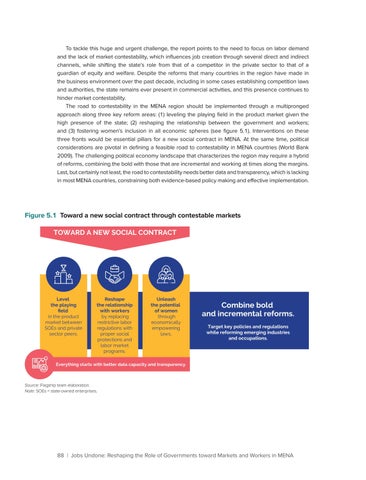To tackle this huge and urgent challenge, the report points to the need to focus on labor demand and the lack of market contestability, which influences job creation through several direct and indirect channels, while shifting the state’s role from that of a competitor in the private sector to that of a guardian of equity and welfare. Despite the reforms that many countries in the region have made in the business environment over the past decade, including in some cases establishing competition laws and authorities, the state remains ever present in commercial activities, and this presence continues to hinder market contestability. The road to contestability in the MENA region should be implemented through a multipronged approach along three key reform areas: (1) leveling the playing field in the product market given the high presence of the state; (2) reshaping the relationship between the government and workers; and (3) fostering women’s inclusion in all economic spheres (see figure 5.1). Interventions on these three fronts would be essential pillars for a new social contract in MENA. At the same time, political considerations are pivotal in defining a feasible road to contestability in MENA countries (World Bank 2009). The challenging political economy landscape that characterizes the region may require a hybrid of reforms, combining the bold with those that are incremental and working at times along the margins. Last, but certainly not least, the road to contestability needs better data and transparency, which is lacking in most MENA countries, constraining both evidence-based policy making and effective implementation.
Figure 5.1 Toward a new social contract through contestable markets TOWARD A NEW SOCIAL CONTRACT
Level the playing field in the product market between SOEs and private sector peers.
Reshape the relationship with workers by replacing restrictive labor regulations with proper social protections and labor market programs.
Unleash the potential of women through economically empowering laws.
Combine bold and incremental reforms. Target key policies and regulations while reforming emerging industries and occupations.
Everything starts with better data capacity and transparency.
Source: Flagship team elaboration. Note: SOEs = state-owned enterprises.
88 | Jobs Undone: Reshaping the Role of Governments toward Markets and Workers in MENA








